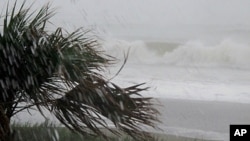The federal and state governments, as well as humanitarian agencies and local groups up and down much of the eastern United States, are in the middle of a massive storm response, as Hurricane Irene makes landfall.
Weather forecasters expect the storm's center to focus on the heavily populated corridor from Washington to New York. The storm already has killed at least one person in Puerto Rico and two in the Dominican Republic and destroyed homes in The Bahamas.
U.S. officials are not taking any chances as Hurricane Irene moves up America's east coast with the potential of affecting 65 million people and causing billions of dollars in damage.
Major airports are closing down for the storm, and train services in parts of the eastern U.S. are suspended. Authorities also ordered a quarter of a million people to leave low-lying areas of New York, marking the city's first-ever mass evacuation. In addition, officials closed the city's entire public transit system for the first time.
A few hours ahead of Irene's early Saturday landfall in North Carolina, state authorities were reporting flooding, power outages and tornado warnings.
Speaking from the eastern part of the state, American Red Cross spokesman Chris Osborne told VOA he and his fellow relief workers were forced to join those evacuating from the coast. But he said that despite the challenges, his organization was working at full speed.
Osborne said, "We've got probably somewhere in the neighborhood of 300 people or so in various shelters. There's probably more than a dozen shelters open in the North Carolina area. And we've got some 70-plus shelters that are on standby, so certainly lots of areas for people who are evacuating."
Osborne says the Red Cross has workers from North Carolina in the south, all the way north past New York. While they are focused mainly on providing the basics of food, shelter and water, he says they have many other tools at their disposal, especially for those who might lose everything.
He said, "We have trained counselors that help people deal with the emotional needs that arise sometimes from these kinds of disasters, so just a wide gambit of resources."
Irene is the first hurricane to seriously threaten the United States in three years. It also hits at the six-year anniversary of Hurricane Katrina, whose flooding killed more than 1,800 people and forced more than a million residents from their homes in the southeastern United States.
The federal response to Katrina was widely criticized as slow and mismanaged, and Osborne says the Red Cross is mindful of that as they mobilize against Irene.
Osborne said, "Every disaster is different. Every disaster is a learning opportunity. We think we learned a lot from Hurricane Katrina, and we think we're better positioned and better ready to serve the people who need us."
He says the Red Cross is working very closely with community partners and government agencies in the relief efforts. U.S. President Barack Obama also has directed federal agencies to ensure all the needed resources are available.




